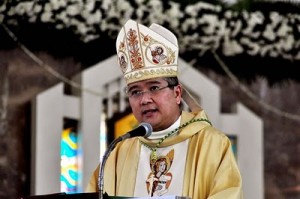CBCP, other groups oppose death penalty reimposition
MANILA, Philippines—The hearing of a Senate panel on the proposed re-imposition of the death penalty in the Philippines was met by strong opposition on Tuesday from various groups led by the Catholic Bishops’ Conference of the Philippines (CBCP).
Rev. Fr. Jerome Secillano, executive secretary of the CBCP, read before the Senate committee on justice joint with committees on constitutional amendments and public order the statement of CBCP President, Archbishop Socrates Villegas, describing the death penalty as “cruel” and “inhumane.”
“There is something terribly self-contradictory about the death penalty, for it is inflicted precisely in social retaliation to the violence unlawfully wielded by offenders. But in carrying out the death penalty, the State assumes the very posture of violence that it condemns,” read the statement, which was signed last July 2, 2014.
Villegas said death penalty is “cruel and inhumane in two senses.”
“First, the terrible anxiety and psychological distress that come on one who awaits the moment of execution constitute the cruel and inhuman punishment that most legal systems today proscribe including the Constitution of our country. It has been rightly said that the anticipation of impending death is more terrible a torture than suffering death itself,” he said.
“Second, the members of the family of the condemned persons, many times including children, are, for their life-times, stigmatized as members of the family of an executed person, bearing with them the price of a crime they never committed,” he further said.
Article continues after this advertisementThe most important consideration, the CBCP said, is the “imperfection of our judicial system.”
Article continues after this advertisement“While the CBCP has every respect for respectable judges, the fact is that the judicial system — including the process of evaluating and weighing evidence — is, like all human systems, liable to error,” said the statement.
“But the death penalty, once executed, is irreversible and no repentance or regret can ever make up for the horrible injustice of a person wrongfully executed.”
The CBCP also pointed out as a state-party to the Second Optional Protocol of the Covenant on Civil and Political Rights, the Philippines assumed its principal obligation to abolish the death penalty.
“We cannot and should not renege on our international obligations, especially when these are not only lawful but moral. Pacta sunt servanda is not only a legal principle. It is key ethical imperative as well,” Villegas added.
The Philippine Human Rights Center or PhilRights, represented in the hearing by Nymia Simbulan, also “strongly” opposed the reimposition of the death penalty, also citing the country’s obligation to the international covenant on civil and political rights and a series of UN resolutions against the use of the death penalty.
“There’s no place for state-sanctioned killing in a modern justice system,” Simbulan said.
She said it would be “embarrassing for the Philippines to spouse universal abolition at the international arena while taking thousands of steps back to the dark ages of state sanctioned execution.”
“In deliberating on the prosed measure, we respectfully request this august body to consider the above mentioned points and to kill the bill reimposing the death penalty…” Simbulan added.
Amnesty International said it also opposes the death penalty in all cases without exemption “regardless of the nature of the crime, the characteristic of the offender or the method used by the state to kill the prisoner.”
“The death penalty is the ultimate denial of human rights,” Wilnor Papa, campaign coordinator of Amnesty International, told the committees.
Papa said death penalty is “discriminatory” and often use “disproportionately against the poor, the minority and members of racial, ethnic and religious community.”
“It is imposed and carried out arbitrarily,” he added.
